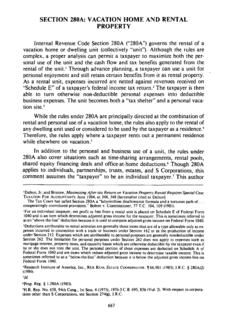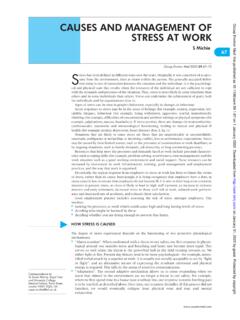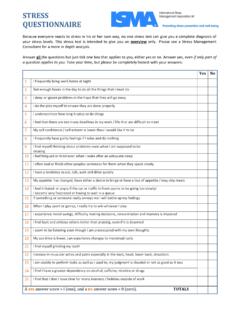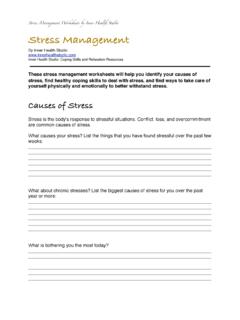Transcription of INTRODUCTION TO STRESS MANAGEMENT
1 Section3 Key Points1 Defining Stress2 Causes of Stress3 Symptoms of Distress4 Managing Stress5 Depression6 SuicideINTRODUCTION TOSTRESS MANAGEMENTR emember that the mind and body are one and thatpsychological health is just as important as physicalhealth to your overall Tips from Army MedicineePersonal Development Track8420010_PD3_p086-093 8/26/08 11:26 AM Page 86 Personal Development TrackIntroductionStressis a fact of life, wherever you are and whatever you are doing. You cannot avoidstress, but you can learn to manage it so it doesn t manage you. Changes in our lives such as going to college, getting married, changing jobs,or illness are frequent sources of STRESS . Keep in mind that changes that cause stresscan also benefit you. Moving away from home to attend college, for example, createspersonal-development opportunities new challenges, friends, and livingarrangements. That is why it s important to know yourself and carefully consider thecauses of STRESS .
2 Learning to do this takes time, and although you cannot avoid STRESS ,the good news is that you can minimize the harmful effects of STRESS , such asdepression or hypertension. The key is to develop an awareness of how you interpret,and react to, circumstances. This awareness will help you develop coping techniquesfor managing STRESS . For example, as an Army platoon leader, managing STRESS willrequire techniques that include an awareness of yourself and your Soldiers. As you will see, the STRESS you encounter as a student differs in intensity fromwhat you may experience in the Army, particularly while deployed or in combat. Theprinciples and techniques you use to manage STRESS are similar, however, as reportedby this second lieutenant after returning from the war in Afghanistan: How do you combat fatigue, STRESS , and fear in yourself? In your Soldiers?In the past seven months (in Afghanistan) I have learned a lot about how I dealwith combat fatigue and STRESS .
3 I have found that finding a little time for myselfeach day or even each week allows me to regenerate and focus. Having a sense of humor and not taking things so personally have also helped reduce my stresslevels. Keeping a notebook with me at all times and writing tasks, missions, oreven just things to do has helped me keep my mind at ease, rather than thinkingthat I have forgotten to do something. Maintaining communication with myfamily and friends, whether through e-mail or phone conversations, also keeps me grounded .. (3rd Brigade, 25th Infantry Division (L)).2LT Gisela Mendonca Defining StressStress is the way human beings react both physically and mentally to changes, events, andsituations in their lives. People experience STRESS in different ways and for different reaction is based on your perception of an event or situation. If you view a situationnegatively, you will likely feel distressed overwhelmed, oppressed, or out of control.
4 Distressis the more familiar form of STRESS . The other form,eustress, results from a positive viewof an event or situation, which is why it is also called good STRESS . Eustresshelps you rise to a challenge and can be an antidote to boredom because itengages focused energy. That energy can easily turn to distress, however, if something causesyou to view the situation as unmanageable or out of control. Many people regard publicspeaking or airplane flights as very stressful causing physical reactions such as an increasedheart rate and a loss of appetite while others look forward to the event. It s often a questionof perception: A positive stressor for one person can be a negative stressor for andpsychological responsesto the pressures of dailylifeIntroduction to STRESS MANAGEMENT 878420010_PD3_p086-093 8/14/08 10:44 AM Page 87 Causes of StressThe most frequent reasons for stressing out fall into three main unsettling effects of feeling that an outside force is challenging or threatening feeling that you have lost personal events such as marriage, changing jobs, divorce, or the death of a relative or friendare the most common causes of STRESS .
5 Although life-threatening events are less common,they can be the most physiologically and psychologically acute. They are usually associatedwith public service career fields in which people experience intense STRESS levels becauseof imminent danger and a high degree of uncertainty police officer, fire and rescue worker,emergency relief worker, and the may not plan to enter a high- STRESS career, but as a college student, you may findthat the demands of college life can create stressful situations. The National Institute ofMental Health (NIMH) notes some of the more common stressors for college students: Increased academic demands Being on your own in a new environment Changes in family relations Financial responsibilities Changes in your social life Exposure to new people, ideas, and temptations Awareness of your sexual identity and orientation Preparing for life after of DistressSymptoms of STRESS fall into three general, but interrelated, categories physical, mental,and emotional.
6 Review this list carefully. If you find yourself frequently experiencingthese symptoms, you are likely feeling distressed: Headaches Fatigue Gastrointestinal problems Hypertension (high blood pressure) Heart problems, such as palpitations Inability to focus/lack of concentration Sleep disturbances, whether it s sleeping too much or an inability to sleep Sweating palms/shaking hands Anxiety Sexual when you don t realize it, STRESS can cause or contribute to serious physicaldisorders. It increases hormones such as adrenaline and corticosterone, which affect yourmetabolism, immune reactions, and other STRESS responses. That can lead to increases inyour heart rate, respiration, blood pressure, and physical demands on your internal changes are also expressions of STRESS . They can include: Irritability Disruptive eating patterns (overeating or under eating) Harsh treatment of others Increased smoking or alcohol consumption 88 SECTION 38420010_PD3_p086-093 8/14/08 10:44 AM Page 88 Isolation Compulsive sustained high level of STRESS is no laughing matter.
7 It can affect every area of your life productivity in the workplace and classroom, increased health risks, and relationships, toname just a StressAs noted in the INTRODUCTION , you can learn to manage STRESS . The first step is understandingyourself better how you react in different situations, what causes you STRESS , and how youbehave when you feel stressed. Once you ve done that, take the following steps:Set priorities. Use the time- MANAGEMENT tips you learned in Section 1. Make a To-Dolist. Decide what is really important to get done today, and what can wait. This helpsyou to know that you are working on your most immediate priorities, and you don thave the STRESS of trying to remember what you should be facing stressful moments. Think about the event or situation you expect toface and rehearse your reactions. Find ways to practice dealing with the challenge. Ifyou know that speaking in front of a group frightens you, practice doing it, perhapsIntroduction to STRESS MANAGEMENT 89 STRESS MANAGEMENT is keyto academic 8/14/08 10:44 AM Page 89with a trusted friend or fellow student.
8 If the pressure of taking tests causes you tofreeze up, buy some practice tests at the school bookstore or online and work withthem when there are no time your expectations. Try to set realistic goals. It s good to push yourself to achieve,but make sure your expectations are realistic. Watch out for perfectionism. Be satisfiedwith doing the best you can. Nobody s perfect not you, not your fellow Cadet, people the liberty to make mistakes, and remember that mistakes can be a a healthy lifestyle. Get plenty of exercise. Eat healthy foods. Allow time for rest andrelaxation. Find a relaxation technique that works for you prayer, yoga, meditation,or breathing exercises. Look for the humor in life, and enjoy to accept change as a part of stays the same. Develop a support systemof friends and relatives you can talk to when needed. Believe in yourself and yourpotential. Remember that many people from disadvantaged backgrounds have goneon to enjoy great success in the same time, avoid those activities that promise release from STRESS while actuallyadding to it.
9 Drinking alcohol (despite what all those TV commercials imply), drinkingcaffeine, smoking, using narcotics (including marijuana), and overeating all add to thebody s STRESS in addition to their other harmful are some other strategies for dealing with STRESS : Schedule time for vacation, breaks in your routine, hobbies, and fun activities. Try to arrange for uninterrupted time to accomplish tasks that need yourconcentration. Arrange some leisure time during which you can do things that youreally enjoy. Avoid scheduling too many appointments, meetings, and classes breaks to catch your breath. Take a few slow, deep breaths whenever youfeel stressed. Breathe from the abdomen and, as you exhale, silently say to yourself, I feel calm. Become an expert at managing your time. Read books, view videos, and attendseminars on time MANAGEMENT . Once you cut down on time wasters, you ll findmore time to recharge yourself.
10 Learn to say no. Setting limits can minimize STRESS . Spend time on yourmainresponsibilities and priorities rather than allowing other people s priorities or needsto dictate how you spend your time. Exercise regularly to reduce muscle tension and promote a sense of well-being. Tap into your support network. Family, friends, and social groups can help whendealing with stressful , a person s inability to deal with STRESS can often lead to clinical with depression have similar symptoms to STRESS , except the symptoms are nottemporary they can last for weeks at a time. Because of the sustained symptoms, the effecton the body, mood, and behavior is often more serious than with temporary can have severe effects on your eating habits, your relationships, your abilityto work and study, and how you think and feel. The illness is not unique to a particulargroup of people or area of the country. Millions of adult Americans, including many collegestudents, suffer from clinical SECTION 3depressiona common mentalillness that affects aperson s body, mood,and thought it causespeople to lose pleasurefrom daily life, cancomplicate othermedical conditions, andcan even lead to suicide8420010_PD3_p086-093 8/14/08 10:44 AM Page 90It s important to understand that clinical depression is a real, not an imaginary s not a passing mood or a sign of personal weakness.


















